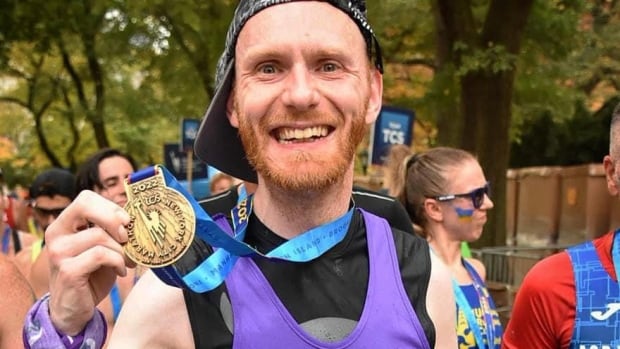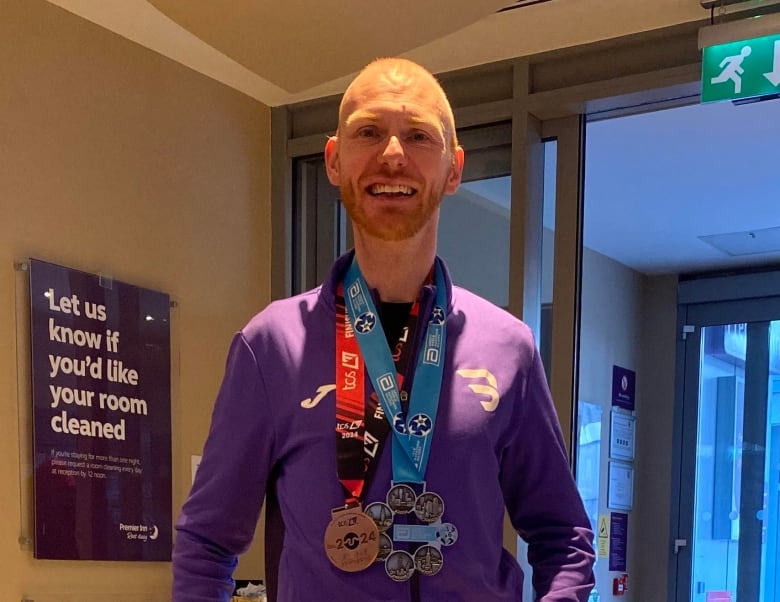
As It Happens5:29How running 6 marathons helped this man with cerebral palsy feel seen
More than a decade ago, Andrew Tomlinson was lying in a hospital bed recovering from a broken hip when he had an epiphany.
The Glasgow man’s cerebral palsy kept him isolated at home for most of his life. But, suddenly, he found himself fantasizing about climbing mountains, running marathons, travelling the globe and meeting new people.
“I kind of realized … I didn’t have any sort of hobbies or social life or friends to sort of share my experiences with,” Tomlinson, 40, told As It Happens host NIi Köksal.
“And finally, I just had enough.”
Thirteen years later, Tomlinson has completed all six of the world’s major marathons — New York, Chicago, Tokyo, Boston, Berlin and, and most recently, London, which he finished on Sunday in just under four hours.
It was amazing. It was the best day of my life,” he said. “It’s just a culmination of all of the experiences, all the different people I’ve met along the way.”
‘It’s opened a whole new way for me’
Cerebral palsy refers to a group of disorders that affect the development of motor control and posture, according to the Cerebral Palsy Canada Network.
It affects individuals differently, with a range of symptoms and severity, including pain, seizures, and difficulty communicating.
And for much of Tomlinson’s life, it also meant being lonely.
“Maybe a prisoner of my own thoughts and social anxiety I found solace in my own company and a games console; a sterile environment where I had control of what was allowed in my world,” he wrote for Cerebral Palsy Scotland after completing the Berlin Marathon in 2021.

Looking back on those words now, he says, is difficult. His world, and his worldview, have completely changed. And running is a huge part of that.
“It’s opened a whole new way for me. It’s so night and day compared to what I was before,” he said.
Not only has the physical activity been helpful, but he’s found community in his fellow runners, and an outlet through which to express himself.
“It’s very difficult to express myself through words sometimes. So by running or by doing crazy challenges, I think I sort of show who I am,” he said.
“Disability, it can be lonely, and I think part of me is wanting to be seen by other people.”
What’s next?
He’s met people all over the world, he says, including other runners with cerebral palsy. But he’s really found a home with his local running group, the Bellahouston Road Runners.
“They’ve not been nothing but supportive of me and, and challenged me and sort of pushed me to believe I can do more and more. I couldn’t do it without them,” he said.
“That is the best thing about the running community — we all support each other. We run as one.”
Now that he’s completed his sextet of marathons, he’s already eyeing his next adventure. When he was in hospital, he’d concocted a plan to climb Mount Kilimanjaro, a feat he achieved in 2017.
“I think I’ll go back to my dreams from the hospital bed and combine my love of hiking with my love of running,” he said. “I’ve got the hankering to do the Everest Marathon.”
The annual race in Solukhumbu, Nepal, is considered one of the highest and toughest marathons in the world.
“Or, if I could get a wee bit of support, maybe [climb] Mera Peak in Nepal, and maybe be the first person with cerebral palsy to climb 6,000 metres,” he said.
“That’s a long shot.”

